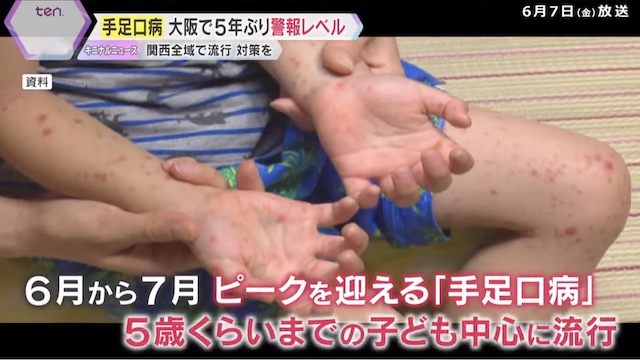OSAKA, Jun 08 (News On Japan) - Hand, foot, and mouth disease (HFMD), a mild, contagious viral infection common in young children, has reached warning levels across various regions in western Japan for the first time in five years.

HFMD, which peaks between June and July, causes rashes on the hands, feet, and inside the mouth, often accompanied by fever. Although rare, it can lead to complications such as meningitis. Generally, the disease is a concern due to the risk of dehydration as children avoid eating and drinking because of mouth pain.
In Osaka, the number of patients per medical institution averaged 6.11 over the past week, surpassing the warning level of 5 for the first time in five years. The disease has also exceeded warning levels in Hyogo, Nara, and Kyoto, spreading throughout the Kansai region.
The unusual surge in infections this year is linked to the preventive measures taken during the COVID-19 pandemic.
Dr. Koji Kanazaki, Director of Kanazaki Children's Clinic: 'Because of the impact of COVID-19, many children had not contracted (hand, foot, and mouth disease), so I think many are now getting infected.'
(Q: Are those who have never contracted it more susceptible?) 'Yes, they are.'
Meanwhile, a kindergarten in Toyonaka City is also dealing with the outbreak. The facility has 97 children aged 0 to 5, and 12 have been infected with hand, foot, and mouth disease over the past two weeks.
Yukiko Nakaoka, Principal of Ueno Hidamari Kindergarten: 'It spreads gradually through saliva and nasal discharge to neighboring classes and to siblings. Even though parents are working, we ask them to take their children to medical facilities during the day if hand, foot, and mouth disease is suspected.'
To prevent further spread, the kindergarten is taking measures such as more frequent disinfection of toys and handrails and urging parents to be vigilant.
As hand, foot, and mouth disease wreaks havoc with the arrival of summer, how can we protect children from this infectious disease?
The infection status in the Kinki region is concerning, with a wide area exceeding the health warning level, including Osaka and Nara for the first time in five years.
Hand, foot, and mouth disease, which spreads in summer, primarily affects infants under five years old and spreads through droplets and contact. Adults with weakened immunity can also contract it.
According to experts, the preventive measures during the COVID-19 pandemic led to fewer outbreaks, resulting in more children without immunity, which may explain the increase in cases. While the risk of severe illness is low, it can sometimes cause meningitis or encephalitis, but most cases recover within a few days.
To prevent infection, the basics are crucial: thorough hand washing, gargling, and wearing masks. Avoid sharing towels. Even after recovery, don't let your guard down, as the virus can remain in the stool for two to four weeks after symptoms disappear. Properly dispose of waste and maintain thorough hand hygiene.
Source: YOMIURI















